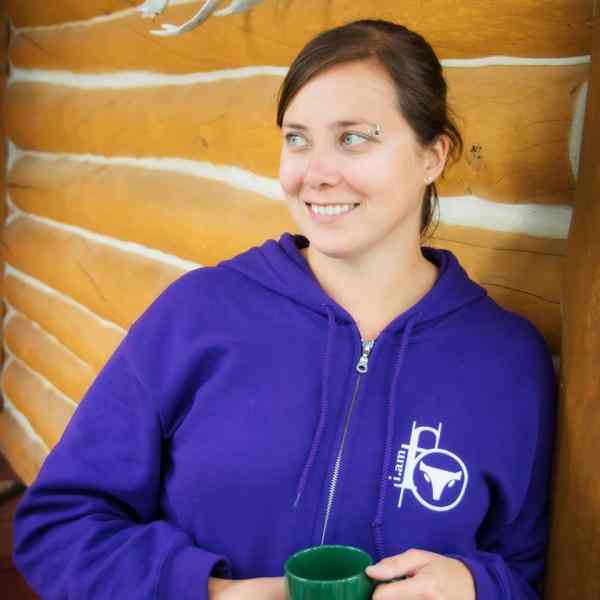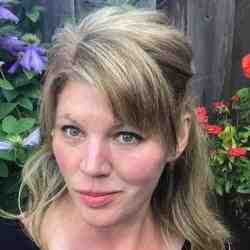Introduction
Candice Lys is cultivating a new generation of young leaders through a novel form of public health education that encourages expression through the arts. In doing so, Candice supports historically marginalized and isolated communities to address deep seeded challenges through evidence-based holistic practices and reciprocal and experiential ways of learning across generations.
The New Idea
Candice Lys cuts to the root of pervasive problems of sexual health in northern, rural and remote communities by using a novel form of public health education. Candice’s FOXY intervenes and break the cycle of gender-based violence through a knowledgeable network of empowered young women using sexual health education to practice asserting themselves. This is accomplished through a supportive environment where girls are empowered to talk openly, practice making healthy choices, and building healthy relationships.
The FOXY model incorporates local Indigenous knowledge and culture to challenge young girls to evaluate and then strengthen their self-perception, using trauma and violence informed approaches. Girls learn how to become emotionally aware and literate, to understand and heal their own immediate social, educational, and sexual health needs. In addition to the youth focussed programming, FOXY activates an alliance of Indigenous Elders, teachers, youth workers, healthcare providers, and community leaders as local “gatekeepers” for the program. In this way, Candice is simultaneously molding positive community perceptions of young girls and fuelling the demand for female youth leadership.
FOXY is a new approach to breaking down boundaries, setting new standards, and mobilizing communities to speak openly about sexual health - a topic viewed often as taboo. FOXY is a movement that puts power in the hands of the youth to tackle, solve and lead change within their own communities, and allows youth to become the stewards of their own bodies.
The Problem
The challenge that FOXY aims to overcome is complex and layered. It addresses sexual health amongst young Indigenous females, while subscribing to issues surrounding safety, wellness, and cultural identity. These issues are the result of a legacy of colonization and residential schools that have had intergenerational effects on Northern communities. Canada’s Residential School System for Aboriginal children separated Aboriginal children from their families, in order to minimize and weaken family ties and cultural linkages, and to indoctrinate children into a new culture—the culture of the legally dominant Euro-Christian Canadian society. The schools were in existence for well over 100 years, and many successive generations of children from the same communities and families endured the experience of them. Children were abused, physically and sexually, and they died in the schools in numbers that would not have been tolerated in any other school system in the country. This experience has been hidden for most of Canada’s history. In 2015 when stories of violence and trauma suffered by Aboriginal children and families were disseminated widely through the Truth and Reconciliation Commission of Canada.
The Women’s Foundation of Canada reports that Indigenous women are eight times more likely to be victims of violence within their intimate relationships compared to non-Indigenous women. This legacy of the residential schools in combination with the geographic isolation of the north further contributes to deep-rooted sexual health problems. The Canadian Arctic Region (three territories of Northwest Territories, Yukon and Nunavut) makes up 39 percent of the land-mass of Canada; it is characterized by a vast tundra with a total population of just 107,000 people living in communities, many that are fly-in only. Healthcare in the North is not always easy to access and waiting a year or more for a counseling appointment is commonplace. This means women and young girls in rural Northern communities (about 50% of the Northwest Territories is Indigenous, though this can be 90% in some of the smaller communities), experience significantly higher gender-based violence, sexual and reproductive health challenges and inadequate access to education than the rest of Canada.
While informational government websites exist for Northerners, they prove to be uninviting, and lack the creativity and accessibility necessary to have impact these young women and their communities need. Furthermore, tightly knit communities in the north, where teachers are often relatives of the students, makes sexual health education taboo and a challenge. Through research conducted while completing her Master’s degree in health promotion, Candice saw that even while factual information on sexual health was available, the young girls were not applying it in real life scenarios. In many cases, young girls were distancing their strong factual knowledge from their own perceived abilities and personal choices. For example, girls could articulate under which scenarios a condom should be used, but reported that they themselves would not use condoms under similar circumstances. Young women with Sexually Transmitted Infections typically felt ashamed and would deal with their challenges themselves to avoid associated stigma. As such, the Public Health Agency of Canada reports a chlamydia prevalence rate approximately 10 times higher among the population living in Northwest Territories than the national average. Adolescent pregnancy rates are also high, with a pregnancy rate for 15-19 year-old women that is 40.0 per 1000 females in the NWT compared to the national average of 28.2 per 1000 females.
Candice realized that the problematic behavior extended beyond the girls’ sexual health and relationships; it was indicative of their lack of confidence and ability to manage their own choices in other areas.
The Strategy
In January 2012, Candice Lys, an Indigenous Northerner from the Northwest Territories, launched FOXY, an organization created in response to the generational and gender gaps in leadership that Candice saw as prevalent throughout Northern communities. An acronym for Fostering Open eXpression among Youth, FOXY creates culturally sensitive peer educational curriculum to develop the leadership and self-determination skills of young girls between the ages of 13 and 17.
FOXY curriculum uses an arts-based approach allowing for the incorporation of cultural features while mitigating common barriers of low literacy and formal education within rural Indigenous communities. For example, Candice and her team draw on the use of traditional hand drums and drumming circles to encourage dialogue and trust among group members. Because drumming in the Arctic is a traditionally male activity, the program enables young girls to practice overcoming societal constraints and challenge their perceived self-efficacy. Candice also uses adaptations of body imaging techniques in which participants draw outlines of their bodies and then imagine and decorate the areas of their body map that react under specific instances of critical decision making. This allows participants to create visual images of themselves as decision makers and leaders of their personal stories. During six-month follow up interviews, FOXY girls report increased confidence and ability to insist on safe sex and healthy relationships.
FOXY’s curriculum is delivered by staff members with Northern heritage working alongside youth leaders. Candice draws from her own background as a Métis person to build meaningful relationships between community gatekeepers and FOXY. Staff are chosen carefully and travel to communities across the North so that the girls feel comfortable to open up and discuss deeply personal and difficult questions.
Once girls have completed the initial curriculum, FOXY staff and community gatekeepers – individuals who are predominantly Indigenous Elders, teachers, principals, health providers, and youth counsellors — identify and recommend girls who demonstrate the greatest leadership potential or who would benefit the most from FOXY programming. Participants are selected for a 9-day Peer Leader Retreat. The retreat brings cohorts of 25 participants from across the North together for a series of workshops and peer development activities designed to transfer skills from decision making in their own sexual health experiences to decision making as community leaders. The curriculum of the peer retreat enforces three pillars 1) always take initiative, 2) practice empathy to understand the needs of others and 3) own your own awesomeness and the mistakes you make.
Graduates of the retreat are designated as official FOXY Peer Leaders and are then supported by staff, community gatekeepers, and their peers to return to their home community to advocate for and launch social change projects. From 2012 to 2016, Candice has designated 175 FOXY Peer Leaders in 28 communities across the Canadian Arctic.
Candice has brokered a formal partnership with the Department of Education in the Northwest Territories to secure official accreditation of FOXY. As a result, girls who successfully complete leadership training with FOXY receive the equivalent of two credits towards their high school diploma. In addition, FOXY Peer Leaders who go on to successfully implement a social change project receive an additional two credits towards high school graduation.
To influence positive perceptions of the leadership potential of young girls, Candice runs intensive region-wide media campaigns highlighting the achievements of FOXY Peer Leaders at local and territorial levels. Candice is regularly featured on the most popular radio station, CBC North. In addition, FOXY programming and youth projects are routinely highlighted in print and online outlets through partner outlets like The Northern Journal and The Northern News Services, and Canada’s The Globe and Mail.
To date, Candice has successfully spread her model to all three Canadian territories: Northwest Territories, Yukon, and Nunavut reaching 2000 youth across the Arctic. Working in 62 percent of communities in Canada’s Arctic, Candice has reached more than 20 percent of youth between the ages of 13 and 17 to date. Her scaling success is due to the ever-growing network of community gatekeepers who identify and recommend girls in their home communities to participate in FOXY programming. Candice has at least one gatekeeper based in 43 (of 69) Northern communities.
In early 2016, Candice responded to community demand for a boys-focused program. In addition to sexual health, boys wanted to talk about expectations of men in a patriarchal society, healing from trauma, and developing their Indigenous identity. These were topics they often struggled with discussing in their families. Candice launched the pilot SMASH (Strength, Masculinities, and Sexual Health) program for boys’ sexual health, in spring 2016. Using digital storytelling, Inuit and Dene games, and sewing circles using moosehide and caribou antlers the school-based SMASH programming began in the NWT in fall 2016, and they will test SMASH in Nunavut and the Yukon in 2017.
Since launching, Candice has secured more than $5 million CAD in support through partnerships with national agencies and private businesses across the north. In December 2014, Candice won the Arctic Inspiration Prize, a $1 million CAD unrestricted scaling grant; the first time ever that the entire award was awarded to a single organization. FOXY has also become well integrated into northern policy circles, and Candice has been invited by Northern Ministers to sit on discussions that are changing policies at the territorial level.
Candice believes that fostering culturally and contextually appropriate programming that combats socio-economic barriers and empowers Indigenous youth leadership has far-reaching implications beyond Canada. She has developed a sustainability plan and is poised to replicate her model to other communities that face extremely challenged geographical and rural conditions, and violence against women among Indigenous peoples.
The Person
Growing up in Fort Smith in Canada’s Northwest Territories, Candice experienced the challenges associated with being a young girl of Indigenous heritage in an isolated community, firsthand. Struggling with an education system that seemed daunting and a high school diploma that seemed unachievable, Candice dropped out of formal education at thirteen and was subsequently challenged by mental health issues. Candice credits the strong matriarchal leadership of her grandmother, a Métis Elder and primary nurturer to a household of 16 children; and of her mother, one of the first Indigenous nurse practitioners in Canada’s North, as the main drivers behind her return to school and ultimate academic success.
During her undergraduate studies at the University of Alberta, Candice sought out opportunities to support youth projects, eventually travelling to Australia and then to Vanuatu and Kenya as a youth ambassador with Youth Challenge International. It was during this time that Candice exercised her entrepreneurial skills by founding and implementing youth-focused health and education projects, experiences that encouraged her to return to school and pursue a Master’s degree in health promotion.
Candice was troubled by barriers to the positive sexual health outcomes for young girls from Canada’s North, and particularly from her home community of Fort Smith. She was disturbed by the lack of culturally and geographically specific resources available. Upon completing her Master’s degree, Candice returned to her home community to address the leadership gap for young girls in Canada’s North, a move that would ultimately lead to the creation of FOXY.




